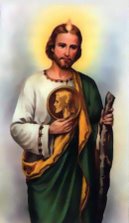
I saw Mighty Marvel's most recent DVD, Ghost Rider, last night. I had tremendous fun watching it, even though I have never been a great fan of the Ghost Rider comics. It stars Nicholas Cage, Peter Fonda, and Sam Elliot, all of whom I consider to be top performers. It is a ripping good yarn, IMO.
Naturally, being Hollywood entertainment, it is rife with bad theology and bad choices. Superhero entertainment is particularly susceptible to this, with all of its Nietzchean overtones. But for a story to be enjoyable, it has to have some truth in it, so there are also good bits you can take away from it.
Like a lot of people, Johnny Blaze's first encounter with the supernatural was with the demonic, in the character of Mephistopheles, the personification of Satan's deceptive ways. The first lesson is, when you do not promptly send evil away, you can get shafted before you know it, and the good things that are offered are really only a cheat.
From his father's death until Mephistopheles activates him as the Ghost Rider, Johnny searches for an escape from his contract and asks if it's possible that he can have a second chance. This is the same mistake that Faust made in Marlowe's play; he remains blind to God's ability to save him , no matter how far he falls. (The notion that one must deliberately sell one's soul to the Devil for him to have any claim on it is likewise deception; rejecting God will do it.)
Blaze seeks to use the power Mephistopheles has imparted to him to do good. This is at best suspect. On the one hand, God can do whatever He wants, including turn around the most horrible of situations. On the other, there really isn't any way you can hope for a good end by doing evil. This is why good ends cannot justify evil means. In the real world, magic comes from the devil, and its use will not lead to good. (See this story and this one for examples of what I mean.) The Devil isn't about to hand out the power to punish evil, as the character Mephistopheles does. On our own, we do not have the power to resist the Devil; such power comes to us only from the grace of God.
The Caretaker tells Blaze that, because his motivation for dealing with the Devil was love, God was with him. This is truth; God loves everyone who seeks to do good and all good works, no matter who does them or why.
In the end, Mephistopheles offers to remove the curse he placed on Johnny Blaze and restore his soul. This time, Blaze refuses him. This was the right decision. First, whatever the Devil offers is a cheat and a lie. Second, since his power gives retribution to evil, it is good. Third, he recognizes and accepts the redemptive power of suffering.


No comments:
Post a Comment